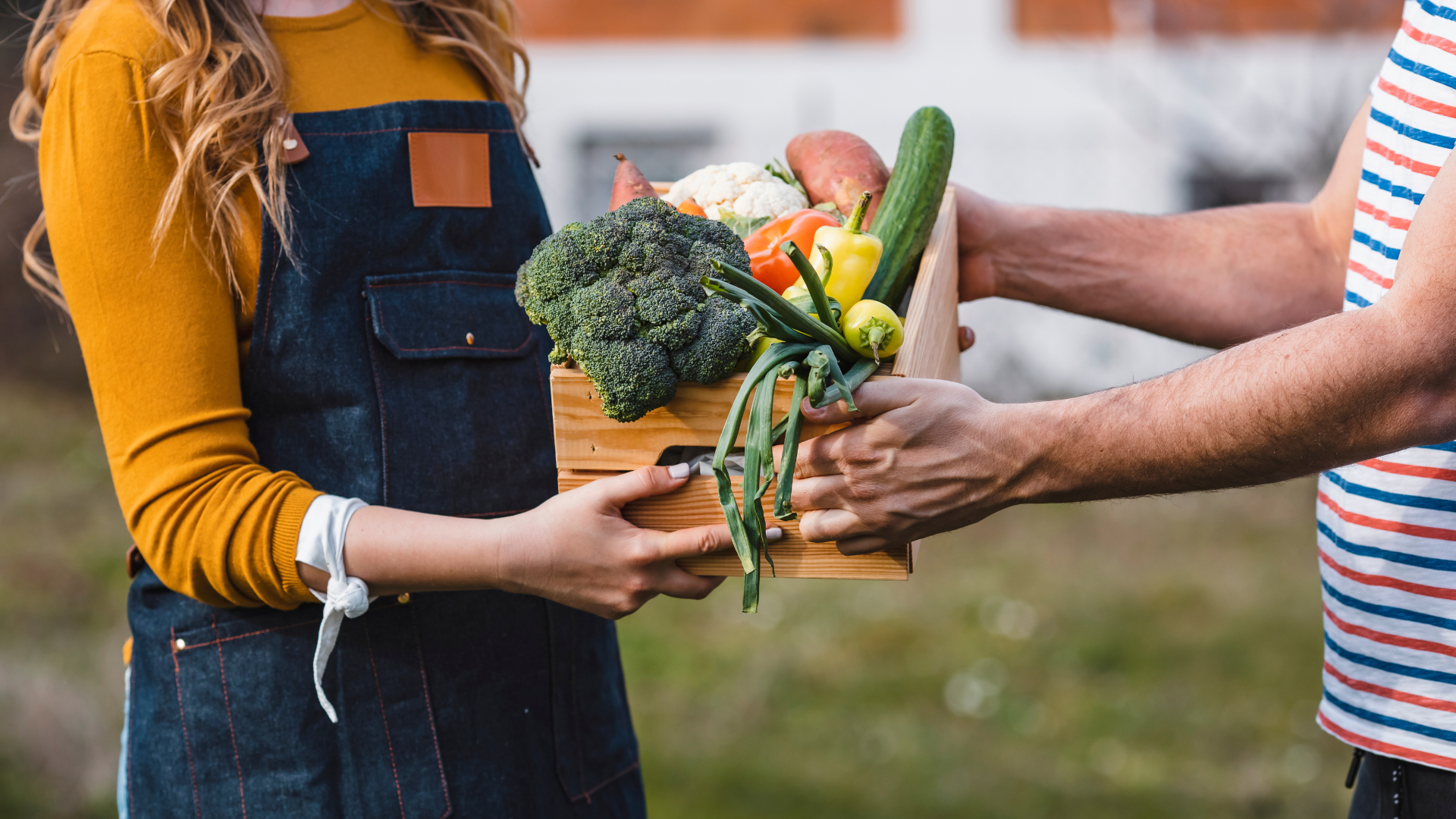Do you think about where your food comes from or how it got here? After the pandemic, more people said they wanted to buy more local food, but what does that mean for Sheffield growers and producers? Today, we explore a dull-sounding subject, short food supply chains, and how they are actually an exciting step forward for a fairer, healthier, greener Sheffield.
What are short food supply chains?
A short food supply chain (SFSC) involves a smaller number of organisations than mainstream food supply chains. Those involved in SFSCs are usually committed to cooperation, local economic development, and maintaining closer geographical and social relations between food producers, processors and consumers. Some common organisations involved in SFSCs are farmers’ markets, farm shops, collective farmers’ shops and community-supported agriculture (CSA).
For ShefFood, SFSCs extend beyond traditional businesses and include everyone in the community involved in food. Local farmers like Moss Valley Market Garden and food producers like Our Cow Molly are essential in the Sheffield food network. However, it’s not just farmers and growers that form an essential part of short-food supply chains.
Food banks like the S2 Food Bank distribute food to those who most need it. Organisations such as Abundance rescue, share, cook, and juice and enjoy fruit which may otherwise go to waste across Sheffield. Allotments such as the ones supported by Heeley And District Allotment Protection Society or the Green City Action Community Allotment in Burngreave provide nutritious food and social benefits beyond food. Finally, many of our city’s fantastic eateries gain produce directly from farmers and serve it to the people of Sheffield.
When you look at SFSCs, they may not be global in scale, but they still create vast networks of passionate people committed to feeding everyone delectable, nourishing local and seasonal foods.
Benefits of Short Food Supply Chains to Sheffield
So, why should short food supply chains be improved and increased in Sheffield? The city will gain three main benefits, matching Sheffield City Council’s ‘Fairer, Healthier, Greener’ food strategy.
Fairer
There has been significant evidence to show that when you spend with local businesses rather than national and global brands, it produces a more substantial financial effect on the local economy (For example, one study found for every £1 spent in a veg box or farmers’ market there was £3.70 in economic, social and environmental returns). A more robust local food industry would create more jobs and better incomes for those in the sector. Plus, it could open up more opportunities for training the next generation of farmers, food producers, retailers and hospitality workers.
Healthier
Making SFSCs the standard in Sheffield will connect more people directly to where their food comes from. When we are educated on food, nutrition, and farming, and when healthy food is locally accessible, we are more likely to choose healthier food options. This is incredibly important at the moment when research in 2019 found that 64 percent of adults in Sheffield were classed as overweight or obese, which can have a significant impact on health long term.
Furthermore, local food producers tend to focus on seasonal growing patterns. Produce that is harvested in its proper season matures longer on the plant, which makes it more nutrient-dense when compared to being picked before its prime, which most supermarket produce is. Reducing the time taken for food to get from farm to fork can also mean produce is fresher and tastier!
Greener
Local food means fewer transport miles, producing fewer emissions. Food grown in the regional environment can be grown in season, using less energy and water in growing setups. Promoting organic, permaculture and wildlife-friendly farming will improve biodiversity. Local food means fewer transport miles, producing fewer emissions. Food grown in the regional environment can be grown in season, using less energy and water in growing setups. Promoting organic, permaculture and wildlife-friendly farming will improve biodiversity. Growing and eating local food doesn’t only involve typical British crops like lettuce and leeks; many crops popular in diverse global cuisines can also be grown in the UK. For example, volunteers at the Green City Action allotments are growing callaloo and lentils. And lastly, when food is grown and harvested as and when it is needed, we can reduce food waste across the city.
How we can improve
So, how do we make short food supply chains the norm in our city? Well, ShefFood has just launched Sheffield’s Local Food Action Plan with the help of almost 100 organisations across the city. This project has over 70 actions planned over the next 7 years to make Sheffield’s food system sustainable and fairer for all, including promoting SFSC within the city. With the help of businesses, universities and the city council, there will be fantastic infrastructure chains, policy updates and project implementations that will make a difference to everyone. These are not just lofty goals but a true plan of action.
Can I support this?
ShefFood believes that grassroots action by the public is key to the changes. It shouldn’t be a top-down approach. Here are some ways you can support the development of SFSCs in your community this year.
- The most obvious option is to shop locally. Whether you go directly to farmers, such as buying Regather’s weekly veg boxes, or shop at local outlets like Beanies Wholefoods, you’ll support the Sheffield economy.
- Support eateries and drinking holes that source locally or work directly with suppliers. Elma’s Cafe, Forge Bakehouse and Tenaya Wines are just some that have committed to these sourcing goals. You can also pick up a delicious meal prepared from locally grown and surplus food on a Pay-As-You-Can-Afford basis from the Food Works Cafes in Sharrow or Upperthorpe.
- Reducing food waste in your home is excellent, but why not use the thousands of tonnes of surplus food already available instead of going shopping? Food Works Sheffield and Abundance are fantastic projects making the most of leftovers and surpluses.
- Give what you can. Food banks and community pantries are a vital lifeline for the most vulnerable in our society. They are just as crucial now as shops in Sheffield’s food system. Most Sheffield Food Bank Network groups are open to food drop-offs, monetary donations and volunteers.
Short food supply chains will create a tight-knit community where better, cheaper, healthier food helps our city thrive. It may not be an exciting subject, but what’s not to love when tasty food is involved?

